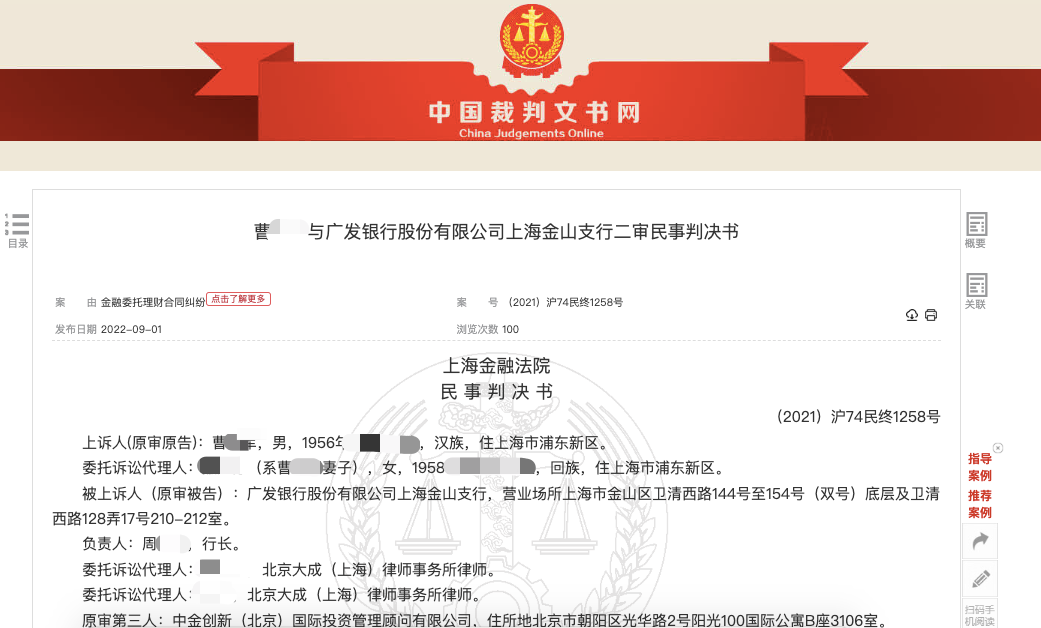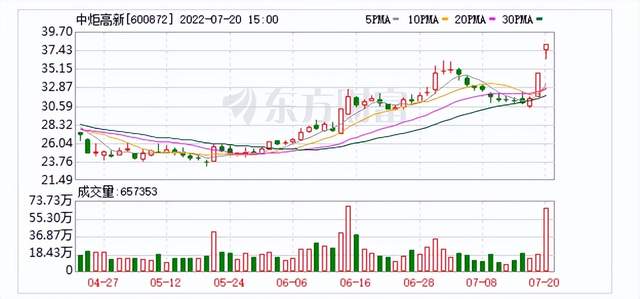It costs 1.3 million to buy the bank's "financial management" but has become a shareholding company. It has not been paid for 3 years. Investors have reported the bank
Author:Red Star News Time:2022.09.11
Recently, the China Referee Book Network announced a dispute of entrusted financial contracts. The judgment shows that investor Mr. Cao said that he originally spent 1.3 million yuan to buy bank financial management, but "became" buying private equity products in Shanghai Jinshan Sub -branch, Guangfa Bank, and also invested in a company. After the product "expired", Mr. Cao could not redeem it, so he prosecuted the bank to the court, asking for compensation for the principal and income, but did not receive the support of the court of first instance ...

↑ Picture according to the China Magistrate Document Network
Investors spend 1.3 million buying banks "wealth management products"
However, it cannot be redeemed when it matures, and it becomes a shareholder of a company
The Red Star Capital Bureau saw from the judgment that Mr. Cao said that in 2010, he deposited about 3 million yuan in the Hangfa Bank Shanghai Jinshan Sub -branch. In mid -2012, Zhou Mou, a staff member of the Shanghai Jinshan Sub -branch of Guangfa Bank, called him that there was a conference specifically for VIP customers inside the bank. The leaders also attended the promotion.
In July 2012, the staff member Zhou contacted Mr. Cao again that the new product of the last promotion was sold and enthusiastically introduced the product to Mr. Cao’s wife, saying that the compound yield of the product reached 60%to 70%, and the product 90%of the compulsory dividends are returned every year, and the entire income is returned in seven years. There is no risk of funds. Many employees of the Shanghai Jinshan Sub -branch of Guangfa Bank are purchased, and the opportunity is rare.
Under the guidance of Zhou, Mr. Cao opened the card at the Shanghai Jinshan Sub -branch of Guangfa Bank, purchased a wealth management product of 1.1 million yuan in principal, and signed on several blank A4 paper in accordance with Zhou's requirements, but did not fill in the date. After a few days, Mr. Cao bought another 200,000 yuan for the wealth management product.
In fact, the "wealth management product" purchased by Mr. Cao was the Zhongjin Luhe Fund, and he also joined the Beijing Zhongjinluhe Entrepreneurship Investment Center (limited partnership). The Red Star Capital Bureau searched from the Tianyan check app and found that Mr. Cao was indeed a shareholder of Beijing Zhongjinluhe Entrepreneurship Investment Center with a shareholding ratio of 1.84%and the amount of contribution of 1.3 million yuan.
Mr. Cao said that he always believed that the product was a wealth management product issued by the Shanghai Jinshan Sub -branch of Guangfa Bank. The bank staff never told him that the product was the Zhongjinluhe Fund. The product was originally expired in August 2019, but Mr. Cao has not been redeemed so far. Then he filed a lawsuit with the court and sued Guangfa Bank Shanghai Jinshan Sub -branch and Beijing Zhongjinlu Entrepreneurship Investment Center (limited partnership) and other courts. Compensation principal and income.
Regulatory authorities believe that banks infringe consumer rights and interests
The bank claims that he is just a middle transfer
The Red Star Capital Bureau noticed that there were not only Mr. Cao, who had the same experience, and a total of 16 investors complained to regulators such as the Banking Insurance Supervision Bureau.
According to the judgment, in October 2019, the Shanghai Banking Supervision Bureau responded to the complaints of 16 people including Mr. Cao; in November 2019, 12 investors complained to the Consumer Protection Agency. On the 19th of the month, the Bank of China insurance supervision and management The Consumer Protection Bureau of the Commission issued a reply letter, and both regulatory agencies pointed out the issue of Guangfa Bank.
It is worth mentioning that in November 2019, the official website of the China Banking Regulatory Commission issued the "Notice on Emperor Insurance and Cases of Consumer Rights". Among them, in 2012, according to its internal "Private Equity Fund (PE) on behalf of the Propaganda Cooperation Product Plan", Guangfa Bank was promoted to private equity funds in the Bank of China. The fund expired in August 2019, with a book floating loss, and the failure to recover the investment capital and income, which caused consumers to complain.
After investigation, Guangfa Bank had 5 aspects of acting in infringement of consumer rights and interests:
The first is to evaluate customers' risk tolerance in accordance with the requirements of regulatory regulatory requirements. The second is that the documents and materials are properly kept in accordance with the regulatory requirements. Third, in the related promotion training materials for internal marketing staff, the risks that fund products may have to and investors may not be mentioned and analyzed. Fourth, the relevant requirements of the product plan were not strictly implemented in the access process. Fifth, the relevant performance work is fully implemented in accordance with the formulation of the product plan.
Nevertheless, in the lawsuit, the Shanghai Jinshan Sub -branch of Guangfa Bank still stated that he was just a middle transfer. Mr. Cao transferred the money to CICC's innovation company through the bank counter. In 2012, there were no appropriate obligations at that time. Proper obligations should not have retrospective power, the amount of losses was not determined, and did not recognize Mr. Cao's demands.
Investors require banks to compensate the principal and interest
The court of the second instance rejected the appeal, but believed that the bank had a negative fault
The Red Star Capital Bureau noticed that Mr. Cao sued the case of Guangfa Bank Shanghai Jinshan Sub -branch and Beijing Zhongjinluhe Entrepreneurship Investment Center (limited partnership), which has undergone two rounds of trial. In the first instance lawsuit, Mr. Cao asked Guangfa Bank Shanghai Jinshan Sub -branch to compensate 1.3 million yuan in principal, and the income loss of 71%of the annual compound yield was 6.461 million yuan, but it was not supported by the first instance court.
In the second trial, Mr. Cao appealed to ask the bank to pay 1.3 million yuan to pay the principal and compensate the loss at 15%of the annualized interest rate. The Shanghai Financial Court also believes that the lack of contracts and legal basis. The Shanghai Financial Court pointed out in the judgment that this case is a dispute caused by individual investors to subscribe for private equity funds at the bank outlets.
The focus of disputes includes: First, the product involved in the product is the financial product issued by Guangfa Bank, the China Jinluhe private equity fund initiated by CICC Innovation Company. Second, whether the product is involved in the case, whether there is an act of promoting sales on behalf of the Shanghai Jinshan Sub -branch of Guangfa Bank, and whether there is any fault. Third, whether Cao Moumou has the right to request compensation for all investment capital and income. The Shanghai Financial Court believes that Mr. Cao did not provide any evidence to provide evidence for any evidence. Understanding; again, according to the "Personal Settlement Business Application" it provided, Mr. Cao's use of transfer money is "funding" as awareness and fulfilling his contribution obligations. Therefore, the court will not accept the above opinions.
Secondly, the Shanghai Financial Court pointed out whether there is a substitute sales behavior and a fault in the Shanghai Jinshan Sub -branch of Guangfa Bank that the Shanghai Financial Court has failed to prove that the risk tolerance of Mr. Cao has been held before the private equity fund products involved in the sales case. The evaluation, and its risk tolerance is matched with the product involved, and it has not been able to provide Mr. Cao's recording and video materials when it is handled by Mr. Cao to prove that it has implemented the regulatory requirements. Therefore, the Shanghai Jinshan Sub -branch of Guangfa Bank did not evaluate the risk tolerance of investors and did not properly keep business information.
Finally, regarding the actual incidence of losses, the court believes that according to the 2019 to 2021 annual report provided by the third party, the private equity fund can distribute assets in three years to increase year by year. From the perspective of the underlying assets invested by the fund, two of them intend to list on the motherboard and the New Third Board, and the future development prospects are better. In summary, Mr. Cao's investment losses have not yet been presented.
In the end, the Shanghai Financial Court made a verdict, rejected Mr. Cao's appeal, and maintained the original judgment. The acceptance fee of more than 30,000 yuan in the second trial was also borne by the appellant, Mr. Cao.
Red Star Journalist Qiang Ya Mill
Responsible editor Deng Yiguang Editor Zhang Li
- END -
Zhongju High -tech will play again to control the power of control.

On July 20, Zhongzhu High -tech (600872.SH) rose the daily limit the next day. Thi...
Hebei Xianghe: The transformation of the breeding industry to high efficiency

↑ A dairy farm in Liu Song Town, Xianghe County, Hebei. (Aviation)The intelligent...